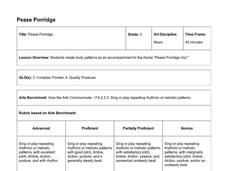Hawaiʻi State Department of Education
Dance Critic
What do writing and dance have in common? They both have a six-trait rubric for assessment. Just like a good story, a good dance must have a hook, beginning, middle, end, logical sequence, and a climax. Learners use a structured...
Hawaiʻi State Department of Education
Pease Porridge
Practice using different ways to express a single pattern. The class uses concrete, pictorial, and numerical modes to represent patterns found in a simple rhyme. They will move their bodies, use body percussion, draw, and use numbers to...
Hawaiʻi State Department of Education
Ostinato
Quarter notes, eighth notes, and rests; it's time to read rhythmic patterns in music. The class plays ostinatos as they practice identifying rhythmic patterns. They then listen to Mannheim Steamroller as they draw geometric patterns that...
Hawaiʻi State Department of Education
Clay Creatures
When little ones make things out of clay they're not just exercising their creativity, they are following directions, developing fine motor skills, and building a sense of pride in their work. First graders use the pinch-and-score...
Hawaiʻi State Department of Education
Beethoven’s 5th
Time to pick up an instrument and practice the first part of Beethoven's symphony No.5. Young musicians discuss melody, rhythmic pattern, dynamics, and movements found in symphonic and orchestral pieces. They then practice and play the...
Hawaiʻi State Department of Education
ABA Form in Music
Patterns happen everywhere, in music, math, and language! Fourth graders listen to the "William Tell Overture" visualizing the patterns that they hear. They then discuss and write an ABA poem that matches the ABA form found in the music...







